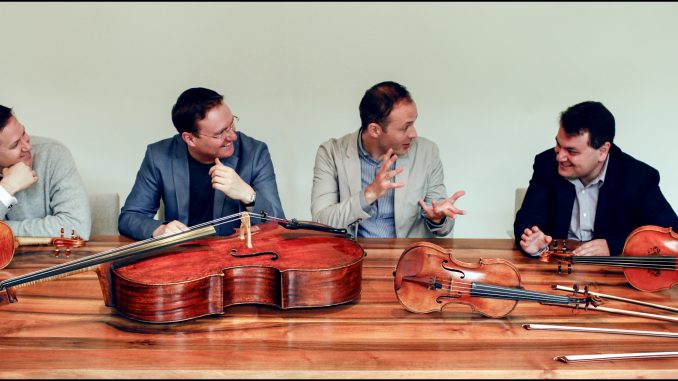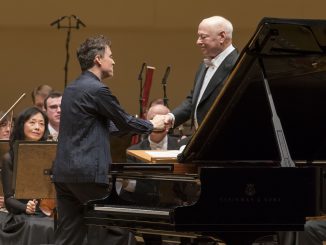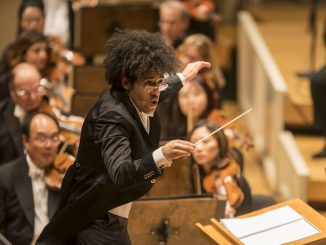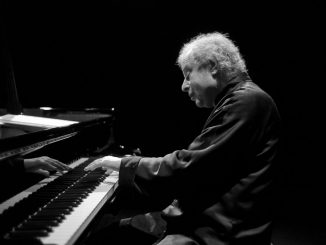
As part of the Symphony Center Presents chamber music series, renowned husband and wife duo Pinchas Zukerman, viola, and Amanda Forsyth, cello, along with the acclaimed Jerusalem Quartet presented a program of lush, fully developed works at Symphony Center, 220 S. Michigan Avenue, Chicago on October 7, 2018.
The Jerusalem Quartet is an Israeli string ensemble with a wide performance repertoire; its members include Alexander Pavlovsky, first violin; Sergei Bresler, second violin; Ori Kam, viola; and Kyril Zlotnikov, cello.
The string sextet has been called “a rare beast”. The form provides for a richness of sound opening possibilities of color and texture for composers and the three primary works performed here, Strauss’ Sextet from Capriccio, Schoenberg’s Verklärte Nacht, (Transfigured Night) and Tchaikovsky’s Souvenir de Florence certainly demonstrate this; these surely must be considered classics of the oeuvre.
– Richard Strauss, String Sextet from Capriccio, Op. 85, 1943
The beautiful, melancholy string Sextet that is the musical introduction to the opera Capriccio, Strauss’s last stage work, completed when he was 78 years old, was conceived as a piece within a piece. The refined strings-only overture that set the stage for the opera to come stands alone as a jewel of late romantic chamber music, with the doubled instrumentation rendering a complex sonority.
– Arnold Schoenberg, Transfigured Night for String Sextet, Opus 4, 1899
In this undeniable instrumental masterpiece, bittersweet yet sensual in feeling, the fine balance of this ensemble hits home. This is thoroughly densely woven music, yet these performers bring it forth with a transparency that paid tribute to each one of the players, who captured every shift of color. Each soloist moved in and out of the “spotlight” in a harmonious and elegant exposition, producing a heartfelt and soulful execution; the first violin in particular seemed to weep with emotion.

– Pyotr Ilyich Tchaikovsky, String Sextet in D minor, Souvenir de Florence, Op. 70, 1890
This is one of the melody master’s most inspired chamber works, a dramatic piece that ingeniously explores the combination of instruments to wonderful effect. The opening Allegro con spirito combines emotionality with balanced harmony in a perfect and satisfying meld; here the Jerusalem Quartet, Zukerman and Forsyth were technically and expressively impeccable throughout, developing a well-proportioned excitement mingled with a sense of delicacy. In the captivating slow movement, with its innocent romantic theme, the cellos especially drenched the audience with warm tones. The third movement, reminiscent of a polonaise, featured a repetitive ominous theme that heralded a spirited finale filled with Russian folk rhythms- in this, the group as a whole proved how effective the combination of strength and technical mastery can be.
– In encore, Pyotr Ilyich Tcaikovsky, Lensky’s Aria from Eugene Onegin, 1878, arr. by Ori Kam
This was an achingly lovely arrangement of the primary character’s premonition of impending death. Containing a tender yet intense melodic line, powerful emotions were transmitted through the music itself, sans the words of the opera.

Throughout the concert, the Jerusalem Quartet played with the “passion, precision and warmth” which has been described as their trademark. Zukerman, renowned as a virtuoso, has for decades been admired for the “expressive lyricism of his playing, singular beauty of tone, and impeccable musicianship”, and justifiably so; Forsyth has deservedly been called “sophisticated” and “hyper-talented”. Together, the six musicians gave a fine demonstration of the beauty and range of the string sextet genre.
For information and tickets to all the great programs of The Chicago Symphony Orchestra, go to www.cso.org




Be the first to comment